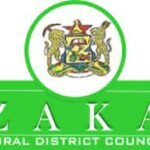…does implementation need revisit?
Emmanuel Chitsika
The principle of devolution adopted by the Zimbabwean government in 2013 with the aim of decentralising power from central to lower tiers of government with the major aim to promote sustainable, representative, accountable, inclusive and socio-economic development among other issues seem to be hitting a nail on a hard wall as far as some operations of local authorities are concerned.
In the past, local authorities used to collect vehicle taxes, the revenue which would be channeled towards various projects like road maintenance and such other issues within their locality, but with the introduction of Zimbabwe National Roads Administration (Zinara) taking over the reins, things have arguably taken another twist.
Incapacitation of local authorities to finance the devolution agenda has been cited as a major undoing, detrimental to the development aim.
Socio-economic activist Abel Sibanda said the audit report on Zinara for the period 2017 and 2019 presented before parliament by the Public Accounts Committee (PAC) concluded that the establishment deviates from its key functions altogether.
“The report presented to PAC on October 27, 2020 following the committee’s analysis of Zinara’s 2017 and 2019 audit reports together with the 2017 forensic audit concluded that the organisation has deviated from its key functions as defined in the enabling Roads Act.
“It also failed its mandate under the same Act hence government was urged to re-examine Zinara’s mandate on whether or not they are fulfilling their obligations and its policy expectations and aspirations from its formation and consider whether the issue of roads and road maintenance still best served by the establishment. Given this background, it is evident that Zinara is failing to adequately execute its mandate as a centralised entity to collect and use the funds collected for the road fund,” said Sibanda.
He went on to say if the principle of devolution was to be followed, local authorities are better positioned to drive the agenda of development.
“Local authorities can do better given that they are the ones with direct knowledge of areas of need in their locales. Corruption noted in several audits at Zinara is a result of centralised funds, where money is managed by a central authority which evidently does not seem to have systems to manage it, corruption is inevitable.
“Decentralising the collection and use of vehicle licence money and other related moneys will help reduce corruption for each local authority will be directly accountable to people and by nature, they would act competitively in trying to effectively use the money and thus generally benefit citizens and motorists in particular,” he added.
Sibanda argued that devolution is rather key when it comes to collection and use of road funds where the collection would be effective, given that local authorities have manpower to enforce payment of licences.
Economist Caleb Gwaindepi said the centralization of revenue collection which used to be the role of councils is negatively impacting on their budgets as they face shortfalls to provide services.
“Government is preaching devolution in terms of service provision but they want to continue holding the revenue flows and determining how the funds are used. So it will be difficult for devolution to be a success as the regions lack adequate budgets and control over their budgets and source of funds,” said Gwaindepi.
Youth economic activist with ActionAid Receive Nyamutamba said the aspect of devolution is still in its infancy as most if not all issues are decided at national level.
“I think devolution in Zimbabwe is still at its infant stage. Most of the things are decided at national level. If you look at the manner in which road projects are handled, one can see that it takes long to implement such projects as even the issues of tenders to prospective constructors are decided at national level.
“Payments are also done at national level meaning devolution is not at play at all. The local authority just oversee the progress but with little or no control over such projects,” said Nyamutamba.
The fact that devolution theoretically seeks to be a policy championing decentralisation as one of its core values sounds to be noble but the practical aspect cease to exist as bureaucracy takes centre stage as the very national-sub entities supposed to be taking control of implementing programmes, are denied the opportunity to do so.
There seem to be a deviation from the chorus of empowering the local people through enhanced participation in such programmes that affect their lives and at the end of the day, the whole essence of empowering the general citizenry is eclipsed after all. The transfer of local fiscal policy responsibilities and resources from central government to lower tiers ceases to exist.







